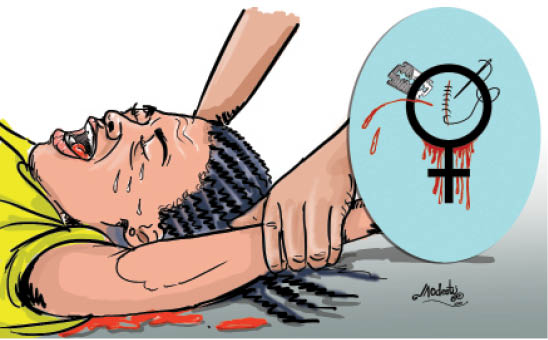GM: Painful cultural practice that refuses to go
Female genital mutilation (FGM) estimated to be prevalent in Africa, especially in the West African countries, is a practice recognised across the world as a violation of the human rights of girls and women. The World Health Organisation (WHO) defines the practice as “all procedures that involve partial or total removal of the external female […]

Female Genital muitlation
Female genital mutilation (FGM) estimated to be prevalent in Africa, especially in the West African countries, is a practice recognised across the world as a violation of the human rights of girls and women.
The World Health Organisation (WHO) defines the practice as “all procedures that involve partial or total removal of the external female genitalia, or other injury to the female genital organs for non-medical reasons”.
The practice is said to reflect deep-rooted inequality between the sexes, and constitutes an extreme form of discrimination against women. The practice is carried out on minors. It also violates a person’s rights to health, security and physical integrity, the right to be free from torture and cruel, inhuman or degrading treatment, and the right to life when the procedure results in death.
While the exact number of girls and women worldwide who have undergone genital mutilation remains unknown, at least 200 million girls and women aged 15–49 from 30 countries have been subjected to the practice, information from the United Nations Children Fund (UNICEF) website revealed.
Nigeria is stated to have the world’s third highest FGM prevalence with estimation that 25 percent or 19.9 million Nigerian girls and women – 15 to 49 years old underwent FGM between 2004 and 2015. These numbers are only third of Egypt’s 27.2 million victims and Ethiopia’s, 23.8 million.
In celebration of the 2020 International Day of Zero Tolerance for Female Genital Mutilation with theme: Unleashing Youth Power which comes up every February 6th as part of the United Nation’s efforts to eradicate female genital mutilation, the UN Secretary-General, António Guterres, said “together we can eliminate female genital mutilation by 2030,” adding that doing so will have a positive ripple effect on the health, education and economic advancement of girls and women.
He said to promote the elimination of female genital mutilation, coordinated and systematic efforts are needed, and they must engage whole communities and focus on human rights, gender equality, sex education, and attention to the needs of women and girls who suffer from its consequences.
A joint statement from the UN office said FGM is a human rights violation and that more than four million girls worldwide are at risk this year, adding that there is need to join hands with young people around the world who are standing up for their rights with urgency and energy.
“While significant progress in eliminating the practice has been made in the last 30 years, approximately 200 million girls and women alive today have had their genitals mutilated. This can lead to long-term physical, psychological and social consequences,” the statement read.
The Director, WHO Department of Sexual and Reproductive Health and Research, Dr Ian Askew, said FGM is not only a catastrophic abuse of human rights that significantly harms the physical and mental health of millions of girls and women, it is also a drain on a country’s vital economic resources, adding that more investment is urgently needed to stop FGM and end the suffering it inflicts.”
The President, National Council of Women Societies (NCWS), Mrs Laraba Shoda, in a statement to mark the day, urged the government of Nigeria at all levels to make laws against female genital mutilation in all communities in Nigeria.
Mrs Shoda who said there is need for government to put an end to the age long practice that has continued to endanger the lives of girls and women, added that government passing a law against FGM would go a long way to reduce the practice and pains women go through during child birth.
